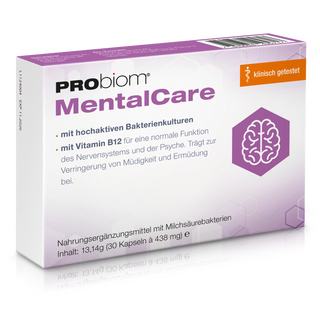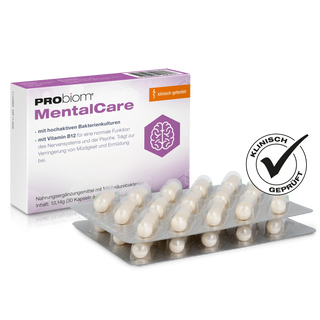What do kimchi, miso, kefir, and sauerkraut have in common? They all belong to the group of fermented foods—and they can do much more than just delight the palate. Recent studies show that fermented foods are not only good for digestion, but also for mental well-being. In a world where stress, irritability, and anxiety are increasingly part of everyday life, it's worth taking a look at these natural mood boosters.
What is fermentation actually?
Fermentation is a natural process in which microorganisms such as lactic acid bacteria, yeasts, or fungi convert sugar and other carbohydrates into acids, gases, or alcohol. This not only creates unique flavors and a longer shelf life for food, but also produces bioactive substances and living microorganisms that have a positive effect on the microbiome.
The connection between gut and psyche
The so-called gut-brain complex is a central topic in modern nutritional medicine. Around 90% of the happiness hormone serotonin is produced in the gut. A healthy gut is therefore an essential foundation for emotional stability. Fermented foods can help stabilize the microbiome, reduce inflammation, and promote the production of mood-related neurotransmitters.
Kimchi: Spicy, fermented and mood-enhancing
Kimchi is a traditional Korean dish made from fermented Chinese cabbage, radishes, garlic, ginger, and chili. Its lactic acid bacteria—particularly Lactobacillus plantarum —are known to have a positive effect on the microbiome. Studies suggest that regular consumption of kimchi may be associated with improved mental health and reduced susceptibility to stress.
In addition, kimchi provides vitamin C, beta-carotene and secondary plant substances that have antioxidant effects and reduce inflammatory processes in the body – another factor for greater mental balance.
Miso: Umami meets mental balance
Miso is a Japanese paste made from fermented soybeans (often with rice or barley) known for its umami flavor. Fermentation with the mold Aspergillus oryzae not only creates a complex flavor but also a high concentration of enzymes and probiotic cultures.
Miso also provides isoflavones and other bioactive substances that have been shown to have a calming effect on the nervous system. Particularly exciting: a Japanese study found a link between regular miso consumption and lower rates of depression in women.
Sauerkraut: The European classic with mood-boosting potential
Sauerkraut is a traditional staple food in many regions of Europe—and a true superfood when eaten raw and unpasteurized. Lactic acid fermentation transforms simple cabbage into a probiotic powerhouse packed with vitamins, enzymes, and lactic acid bacteria.
Fermentation produces B vitamins (especially B12 under certain conditions), which are essential for nerve function and the formation of neurotransmitters. Sauerkraut promotes diversity in the gut microbiome, improves digestion, and can contribute to long-term stabilization of mental health.
Kefir & Yogurt: Mild fermented heroes for everyday life
Dairy products such as yogurt and kefir are particularly popular in Western cultures. Kefir contains not only lactic acid bacteria but also yeast, which ensures a particularly high level of microbial diversity. Studies show that probiotic dairy products can lower cortisol levels and improve emotional resilience.
Important: Look for products with live cultures and no added sugar. Even better is homemade kefir or yogurt with active starter cultures.
Scientific studies on mood through fermented food
A 2022 randomized trial at University College Cork in Ireland showed that participants who consumed fermented foods daily for four weeks experienced significantly less stress than the control group. This was due to measurable changes in the microbiome and a decrease in inflammatory markers.
Another study from California found that people with a high consumption of fermented vegetables reported fewer depressive symptoms and had better sleep quality.
Everyday tips: How to integrate fermented food into your routine
-
Start your day with a spoonful of sauerkraut or kimchi as a side dish to your breakfast.
-
Use miso paste as a base for soups, dressings or dips.
-
Drink kefir or combine it with fruit as a smoothie.
-
Add fermented products gradually to gently accustom your gut.
-
Pay attention to quality: Unpasteurized, organic products contain the most live cultures.
Conclusion: Fermented foods for more emotional balance
Kimchi, miso, sauerkraut, and the like are more than just trendy superfoods. They are vibrant helpers for your mental health. Through their effects on the microbiome, inflammatory metabolism, and neurotransmitter production, they can make a valuable contribution to greater inner peace, balance, and joy in life.
By regularly and mindfully integrating fermented foods into your daily routine, you not only support your body but also your mental balance – completely naturally and with great taste.













